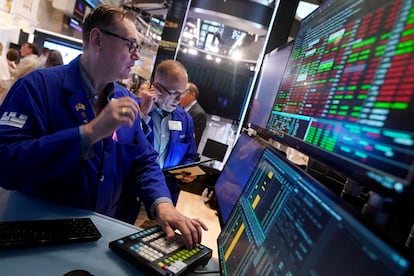Money doesn’t fear geopolitical shocks: Markets are ignoring the global instability
According to experts, valuations of tech companies, interest rate developments and corporate earnings are overshadowing political risks on investors’ list of concerns

Financial markets’ ability to absorb negative geopolitical news — from the possibility of a sprawling war in the Middle East and the entrenched conflict in Ukraine to the new wave of protectionism that would strain relations between China and the West if Donald Trump wins the White House — has created a clear dissonance between the international and economic pages of a newspaper. While the former report on the increasingly unstable global context — with targeted assassinations by Israel, incursions by Ukrainian troops into Russian territory, tariff wars between Washington, Brussels and Beijing, insecurity on the supply routes of the Red Sea, and growing unrest in Venezuela —, the financial news is largely reporting on the strong performance of the stock markets in the United States and Europe, the record results of Apple, Nvidia and other large technology companies, and the containment of the price of crude oil.
“It’s not that politics has stopped being important, it’s that there are other elements that have greater weight,” says economist Javier Santacruz. The market, in fact, seems to be more focused on the increase in corporate profits, the speed of interest rate cuts by central banks, the promises of cost savings and innovation from obstipation and artificial intelligence, and the evolution of the valuations of the technological giants, than on the threats made by foreign ministries or the missiles flying over petro-states.
Natalia Aguirre, director of analysis at the financial services company Renta 4, believes that certain news items tend to generate a lot of noise that then fades away. “Geopolitics has an impact in the short term, increasing volatility and can lead to profit-taking in markets, but the macro is more important, understood as growth, inflation, what central banks do with interest rates... and the micro, that is, business results, what companies do and their profits in the medium term.”
How oil reacts to geopolitical shocks is one of the most complex issues. Several experts from the European Central Bank studied this in depth and published an article on the subject, using real-world examples. “Immediately after the 9/11 attacks, Brent prices increased by 5% [...] However, within 14 days, the price dropped by around 25% on the back of concerns about weakening oil demand. When Russia invaded Ukraine in February 2022, Brent prices increased by almost 30% within the first two weeks following the invasion. However, prices then decreased again, returning to their pre-invasion levels after around eight weeks. More recently, Brent prices increased by about 4% after the terrorist attacks in Israel on 7 October 2023 before subsequently stabilizing,” the report notes.
The lesson, therefore, is that the markets absorbs shocks very quickly, and sometimes return to the pre-shock state, or even move in the opposite direction. “Geopolitically, Ukraine matters if it affects the price of gas, and it no longer does. The warehouses are full, and the price has fallen by 90%. Iran would matter if it closed the Strait of Hormuz, but it would not do so because it would greatly harm China, which is its supporter,” says Ignacio de la Torre, chief economist at Arcano Partners.
In a recent report, Swiss bank UBS argued that it was a mistake to exit stocks in response to negative geopolitical news. “Although market shocks from war and geopolitical crises tend to have temporary effects on long-term market growth, investors are often inclined to sell because of immediate uncertainty, hoping to reinvest in the market after the crisis has passed. Selling is counterproductive, locking in otherwise temporary losses and degrading your ability to participate in the next market recovery.”
Sometimes, the issue is that the geopolitical risks are based on no more than threats. Santacruz explains: “Right now, we are faced with a very high concentration of geopolitical risks, but with less probability of them taking place. Wars are ruled out, as are tensions, protectionism... It’s all pretty much taken for granted.”
The volatility generated by these crises and the risk of them worsening is just another market factor. Traders who buy and sell shares in minutes have to operate taking into account their consequences. In the same way, traders looking at the long term can find many new opportunities when investors overreact to global shocks. For example, as the stock market assumed there would be a long inflationary season due to the severe energy supply problems in Europe following Putin’s invasion, investors who bet on a more optimistic scenario would have reaped the rewards.
“Markets are constantly in a state of uncertainty and flux, and money is made by discounting the obvious and betting on the unexpected,” says a quote from the famous investor George Soros. It was not expected that in 2024 the S&P 500 — the index that groups the 500 most important companies in the United States — would reach historical highs after a very favorable 2023 and amid the widening geopolitical crisis in the Middle East.
But Aguirre is quick to put into context the supposed euphoria in the stock markets and their resilience to geopolitical shocks. “There is profit-taking in various market segments that could be under stress, such as the big technology companies and in China, both due to their internal economic weakness and international pressures. Trump has promised additional tariffs of more than 60% if he wins, so part of the market fall in China is geopolitical,” he explains.
He also points to France, where the crisis of governability resulting from the legislative elections has translated into a poorer performance of the stock market. Roland Gillet, professor of Financial Economics at the Sorbonne University in Paris and at the Free University of Brussels, believes that the misgivings about the influence that the radical left may have on the government may “cause many companies to flee for fear of tax increases.” And in a context of high deficits and debt, he warns that the situation of the French coffers could worsen if the New Popular Front is able to push forward its program of increased spending. “It is the biggest problem in Europe, leaving aside the wars,” he says.
There is also the possibility that traders who ignore geopolitics are making a mistake. Experts at ING Think believe that investors may be underestimating the fallout from the assassination of Hamas’s top political leader, Ismail Haniyeh. “The market will likely need to price in a larger geopolitical risk premium until these tensions subside,” it argued in a note.
There is another factor at play that may explain the markets’ resilience to geopolitical shocks. Machine-driven algorithmic trading accounts for an increasing proportion of daily oil trading — up to 70%, according to TD Bank and JPMorgan. And algorithms do not understand emotions, or geopolitical analysis.
Interest rates versus geopolitics
The reality is that market movements are often difficult to explain, and certainly to anticipate. De la Torre argues that the market’s focus is elsewhere. “The good inflation data in the U.S. allow us to glimpse interest rate cuts in September. When the cost of capital falls, the stock market rises. That is much more important in economic terms than the assassination of a Hamas leader in Tehran.”
Interest rate cuts are one of the biggest factors behind a bullish market and the economy in general — so much so, that in the U.S., there is often a debate about whether rates should be cut before an election, given how this stimulus may benefit the ruling party. Buffett once low rates for investors to long jump athletes not having gravity: they allow traders to earn more or go further with the same effort.
There is one date that does seem destined to leave its mark on the markets: the U.S. elections on 5 November. Market operators will be following the result closely, as will analysts such as Natalia Aguirre. “We will all be watching it. And there is already talk of the Trump Trade, that is, of which assets and sectors could benefit or be harmed if he wins,” she says.
Sign up for our weekly newsletter to get more English-language news coverage from EL PAÍS USA Edition
Tu suscripción se está usando en otro dispositivo
¿Quieres añadir otro usuario a tu suscripción?
Si continúas leyendo en este dispositivo, no se podrá leer en el otro.
FlechaTu suscripción se está usando en otro dispositivo y solo puedes acceder a EL PAÍS desde un dispositivo a la vez.
Si quieres compartir tu cuenta, cambia tu suscripción a la modalidad Premium, así podrás añadir otro usuario. Cada uno accederá con su propia cuenta de email, lo que os permitirá personalizar vuestra experiencia en EL PAÍS.
¿Tienes una suscripción de empresa? Accede aquí para contratar más cuentas.
En el caso de no saber quién está usando tu cuenta, te recomendamos cambiar tu contraseña aquí.
Si decides continuar compartiendo tu cuenta, este mensaje se mostrará en tu dispositivo y en el de la otra persona que está usando tu cuenta de forma indefinida, afectando a tu experiencia de lectura. Puedes consultar aquí los términos y condiciones de la suscripción digital.









































